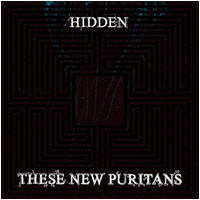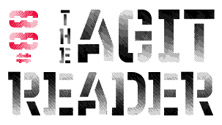
The Brutalist Bricks
Matador
Ted Leo’s songs are perpetually caught between pop music and punk rock, without ever resembling the dubious genre known as “pop punk.” That winning marriage of the catchy with the visceral has attracted and retained a modest, yet passionate, fan base over the past 10 years. In fact, a solid offering from Leo and his Pharmacists has almost become a foregone conclusion, though they haven’t really wowed us since the twin masterpieces, Tyranny of Distance and Hearts of Oak. Longtime fans will be happy to know that The Brutalist Bricks is Leo’s tightest, most consistent album since Hearts. It presents the perfect opportunity for listeners who may have forgotten about him to rediscover one of the most talented pure songwriters of the 2000s, while providing an undaunting entry point for newcomers.
Leo’s always been one of the best political lyricists, running the gamut between trenchant wit and fiery outrage while never devolving into propaganda or sloganeering. And although he’s by no means lightened up, for the first time in a while it sounds like he’s capable of falling in love and enjoying life despite the fact that the world’s gone to Hell. On “Bartolomeo and the Buzzing of Bees,” Leo belts out, “We had the best of an imperfect world” in his trademark throat-splitting tenor. And on “Ativan Eyes,” even though “the new millennium is tough,” his spirit isn’t so damaged that he can’t find happiness through companionship.
Of course, we shouldn’t take everything Leo says at face value; after all, the title of “Ativan Eyes” invokes an anti-anxiety drug which is hardly a suitable way to deal with the world’s ills. But Leo’s no cynic, nor is he an optimistic flower child. He’s merely back in touch with the reasons why the world’s worth fighting for in the first place.
David Holmes
MP3: “The Mighty Sparrow”

jj nº 3
Secretly Canadian
Upon first hearing jj nº 3, actually the second full-length by oddball Swedes JJ, you wouldn’t be wrong in aligning the group with virtually every other Nordic import of innocuous pop those Scandinavians produce. Once you’re in their trance, though, breathing in their fog of mystery, you realize they’re actually situational pranksters, making bastard pop of the most sophisticated order. On the surface, the music consists of smart economical beats, twee atmospherics, celestial voice, plucked strings and blurred bells. At higher tempos, as on “Into the Light,” JJ weave an icy Tropicalia rooted in midnight hip-hop instrumentals. When things slow down, they tend to soar into a new age–doped wooziness. A sign of pop evolving past post-modernism is “Let Go,” wherein Enya and Enigma can be referenced to the album’s hypnotic centerpiece. All the while, they’re still keeping with the twee prettiness and purity that defines their peers.
Though less playful and sunny than its predecessor, jj nº 3, shouldn’t be taken so seriously. Though there are a number of somber—even passionate—moments on the album, JJ, whoever they are, continue with their subtle madcap explorations. “My Life,” the piano-led chamber-pop opener, is enough proof alone that they’re chuckling with a straight face. In it they quote Lil’ Wayne and riff on ATC’s “Around the World” (look it up) as the cherry on top. The mining of Eurovision pap and samples of Italian football announcers aren’t distractions, though. Instead they appear as idiosyncrasies disguised as clever adornment. By the time you reach “No Escapin’ This,” the head-scratching wanes and you’re simply enjoying pop for pop’s sake. As always, the truth is in the songs, and no matter the extent of novelty on jj nº 3, the latter thankfully wins out.
Kevin J. Elliott
MP3: “Let Go”

Hidden
Domino
As far as art rock goes, there’s really no limit. Boundaries are thrown out as soon as the label comes up (think Sonic Youth or Björk). These New Puritans think like that, culling from years of hard work laid down by other artists to produce their decidedly Björk-ian compositions. What they end up with is more along the lines of glitchy chamber-goth music. Some tracks, like “We Want War” and “Attack Music,” which both feature a puzzling de-sheathed sword sound effect, are polyrhythmic explosions that could spin right along with the darker Björk stuff. Others, like “5” and “Canticle,” are decidedly bland, yet pretty, conservatory-grad exercises that, quite honestly, don’t fit with the overall dark melodies and bumping beats festooning the rest of the album. Still, “Drum Courts—Where Corals Lie” manages to actually tie the two motifs together deftly, with Jack Barnett’s droned vocals over (synthesized?) woodwind sweeps and slamming, maxed out tom-toms. “White Chords” is These New Puritans’ attempt at the frantic, whispered emotion of the current reigning kings of nü-goth, Xiu Xiu. This is only the second album from these young Brits, so a few missteps here and there can be forgiven. After all, there is an audience for this sound, as These New Puritans have crossed the pond to tour the States in support of first record Beat Pyramid. Perhaps it would be wise to drop the over-affected art-rock style and set some boundaries and maybe focus on the exciting beat heavy sound that works best on Hidden.
Michael P. O’Shaughnessy

Beat the Devil’s Tattoo
Abstract Dragon/Vagrant
From the foot-stomping intro to the title track of Black Rebel Motorcycle Club’s fifth studio album, it’s clear that this is part of the continuing bluesy evolution that the band began with 2005’s Howl. It’s an appropriate introduction, since “Beat the Devil’s Tattoo,” inspired by an Edgar Allen Poe short story, refers to incessant foot-tapping or drumming one’s fingers on a surface. The song eventually builds to a dirty, rollicking crescendo with an infusion of country twang and beats courtesy of drummer Leah Shapiro, former touring drummer for the Raveonettes who has now joined Peter Hayes and Robert Levon Been.
Since first emerging in 2001 with a wall of sound a la the Jesus and Mary Chain on BRMC, the band’s feedback has given way on the last two records to a retrograde of country, blues and gospel influences. But this record is still an evolution, with its 13 tracks eclipsing those of Howl. There are nods to the band’s shoegazed sound of old in the swaggering “Evol” and “Shadow’s Keeper,” but now it seems definitely of their own making rather than merely reminiscent of others. But while Beat the Devil’s Tattoo might crystallize the band’s sound, it doesn’t trap it in amber, leaving room for more changes ahead.
Josie Rubio

The Winter of Mixed Drinks
FatCat
With The Midnight Organ Fight, its second album from 2008, Glaswegian band Frightened Rabbit stumbled onto a winning combination of cathartic hootenanny, Updikian tropes, and an Arab Strap–like sense of despondency (minus the alky accents) that set the ears aflame of damn near everyone that heard it. That album was very much the sound of the young band coming into its own, realizing its substantial prowess and how to very best use it.
Two years later, Frightened Rabbit has returned with the results to the difficult task of making a follow-up worthy of its predecessor, in this case also known as The Winter of Mixed Drinks. Principal songwriter Scott Hutchinson seems to hint at the challenge right off on opening track “Things,” where he sings “like a new skin made from old skin” in his brogued warble. But as throughout the album, his words are more likely tapping multiple points of view—band member, paramour, citizen of the world, etc.—for a more universal theme. There is never the transcendent moment of Fight’s “Keep Yourself Warm,” but with added mechanization figuring into the Rabbit’s manic whir, Winter maintains a heightened pitch, even if it never crests. Songs like “Skip the Youth” show the band’s fervor hasn’t dampened one bit, even when being applied from a slightly different angle, and one’s reminded of the best bits by bands like the Frames and Idlewild. Fight may have been the breakthrough, but Winter proves Frightened Rabbit’s sustained mettle.
Stephen Slaybaugh

Black Magic: All Mysteries Revealed
Volcom
In a sense, Year Long Disaster can be viewed as a rock supergroup. Consisting of guitarist/vocalist Daniel Davies (son of Dave Davies of the Kinks), bassist Rich Mullins of the stoner metal band Karma To Burn, and drummer Brad Hargreaves of alternative-rock hitmakers Third Eye Blind, it might seem like an unlikely trio on paper, but with their self-titled debut album and follow-up, Black Magic: All Mysteries Revealed, Year Long Disaster has carved out a niche of its own in the hard-rock universe.
Throughout Black Magic, the band exhibits remarkable restraint for a hard-rock band that has more than a hint of a classic metal influence running through its sound. But the pyrotechnics are kept in check, and the songs typically clock in around a modest three or four minutes, almost as if the band has trimmed the excesses of the genre in favor of developing compact, but powerful songs. There are certainly some Zeppelin moments in the opening title track and the acoustic “Seven of Swords.” But for the most part, it’s clear that the band has worked hard to develop its own sound: energetic heavy rock reliant upon competent, melodic guitar and bass riffs and precise drumming that’s never wary of turning on a dime.
The album is purportedly based, at least loosely, upon The Master and Margarita, an early 20th-century Russian novel in which the Devil visits the Soviet Union. Throughout the record, the lyrics do delve into the darker edges of life, but never in a way that comes across as forced or overstated. This exploration into supernatural darkness is perhaps best manifested in the album’s centerpiece and highlight, “Sparrow Hill,” a great rocker in which a haunting mid-song breakdown is bookended by driving riffs and a strong vocal. It’s songs like this that indicate that this improbable group deserves a shot to compete with hard rock’s big boys.
Ron Wadlinger
MP3: “Show Me Your Teeth”

The Law of Large Numbers
Chemikal Underground
As a member of the Delgados, Emma Pollock helped create august indie pop brewed from a course grind of emotion (see the drug-addicted despair of The Great Eastern or the lesson-in-spite of Hate). This paradoxical mix was wondrous as much for the majestic manner in which seemingly at odds elements were juxtaposed as for the beguiling melodies that sustained every utterance to which the band put its name.
By comparison, Pollock’s latest solo album (the band parted ways almost five years ago) is nothing so jarring. Made, like her debut, with husband producer (and former Delgados drummer) Paul Savage, The Law of Large Numbers is much more subdued than the records her former band made. Taken as a whole, the album seems almost lacksadasical, but perhaps that’s the point—maybe it doesn’t have to be so hard. While “I Could Be a Saint” highlights the album, not just for recalling the Delgados’ swansong, Universal Audio, but also for witty refrains like “How are you going to break my heart, when you never even made my day?” the majority of the album is more subtle. “House on the Hill” is a wind-swept piano lament that reveals Pollock relying on the emotional weight of her voice rather than on wits. Similarly, “The Loop,” which begins a capella, is compelling for the strength of its simple elements. Pollock may not be making the records she once did, but to our pleasant surprise, that is not catastrophe, but accomplishment.
Stephen Slaybaugh
ALBUM REVIEWS
Seabear, We Built a Fire
Adam Green, Minor Love
Aloha, Home Acres
Miles Kurosky, The Desert of Shallow Effects
Robert Pollard, We All Got Out of the Army
Bridges & Blinking Lights, Heroes, Guns & Snakes
Blessure Grave, Judged By Twelve, Carried By Six
Clogs, The Creatures in the Garden of Lady Walton
Xiu Xiu, Dear God, I Hate Myself
Jaga Jazzist, One-Armed Bandit
Moon Duo, Escape
Strange Boys, Be Brave
Freeway and Jake One, The Stimulus Package
Groove Armada, Black Light
